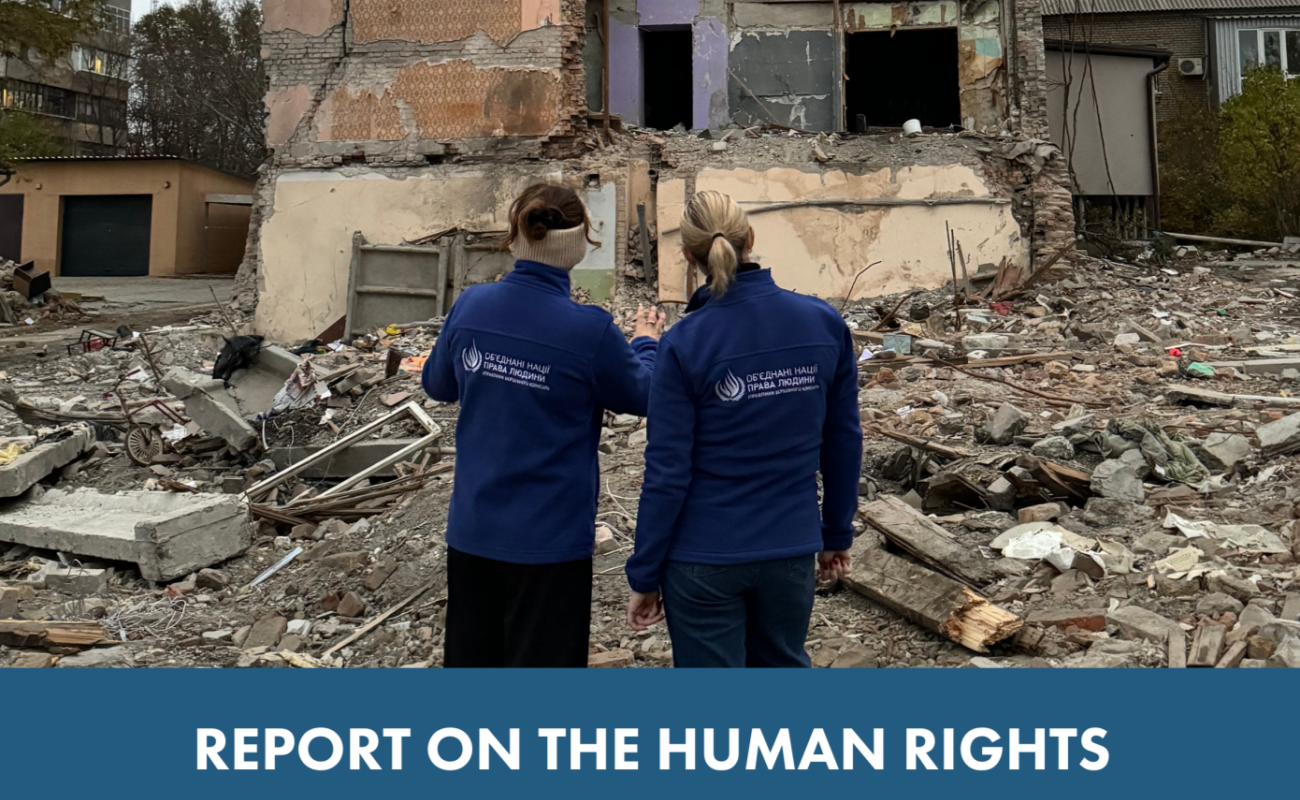Ukraine: Human rights situation remains bleak three years after Russia’s full-scale armed attack - UN report

Almost three years into Russia’s full-scale armed attack on Ukraine, the human rights situation remains bleak with a still-rising number of civilian casualties, continued executions and torture of prisoners of war (POWs), and efforts by Russia to solidify its control of occupied Ukrainian territory, according to a report released today by the UN Human Rights Office, through its UN Human Rights Monitoring Mission in Ukraine (HRMMU).
The report, which covers the period from September to November 2024, details human rights violations linked to the conflict, highlighting intensified Russian attacks on populated areas, deliberate strikes on energy infrastructure, and efforts to restrict fundamental rights.
“Behind each of the facts and figures in this report are stories of loss and human suffering, showing the devastating impact of the war across Ukraine,” said Danielle Bell, Head of the HRMMU. “September marked the highest monthly toll since July 2022, with my team documenting 574 civilian deaths and 3,032 injured over the three months,” she added.
Ninety-three per cent of casualties occurred in Government-controlled areas, especially in Donetsk, Kharkiv, and Kherson, where military activity remains most intense.
Modified aerial bombs, which can now glide tens of kilometers into large cities like Kharkiv and Sumy before exploding, killed 108 civilians and injured 755. New deployments of these bombs in Zaporizhzhia city since September have contributed to this escalation. On 7 November, glide bombs struck residential areas in Zaporizhzhia city, killing nine civilians and injuring 42. Meanwhile, short-range drones carrying explosive devices killed 67 civilians and injured 528, with attacks often targeting civilian vehicles, including humanitarian convoys.
On 17 and 28 November, Russian armed forces resumed coordinated large-scale aerial attacks on Ukraine’s critical energy infrastructure, further diminishing Ukraine’s energy capacity as winter approached. The attacks disrupted electricity supply and energy-dependent services such as water, heating, and transportation in multiple regions.
The report details continued executions, torture, and ill-treatment of prisoners of war (POWs). Since August 2024, there has been a significant increase in credible allegations of executions of Ukrainian POWs, involving at least 62 victims in 19 incidents. The UN Human Rights Office/HRMMU has independently verified the killing of 15 Ukrainian POWs, based on witness accounts and analysis of video and photographic materials.
The report also documents a continuation of widespread and systematic torture and ill-treatment of Ukrainian POWs. Interviews with 42 recently released POWs, including 11 women, revealed that all of them had experienced torture, including beatings, being subjected to electric shock, and prolonged solitary confinement. Sexual violence, against both women and men, was also prevalent.
The report describes the torture and ill-treatment of Russian POWs by Ukrainian authorities, predominantly while held in transit facilities during the early stages of captivity. The Office documented the death of one Russian POW at a transit facility in early 2024 due to torture and is looking into two additional credible allegations of deaths of Russian POWs under similar circumstances.
In occupied territory, the Russian Federation further entrenched its control through the imposition of Russian laws, in violation of its obligations under international humanitarian law. The occupying authorities required residents to obtain Russian citizenship to retain property rights. They also confiscated homes deemed “abandoned” after the rightful owners had been forcibly displaced, which is likely to make their right to return home difficult to exercise.
The occupying authorities reinforced their policy of compelling children to be loyal to the Russian State. A newly adopted state cultural policy in the Russian Federation prioritized the “integration” of people in occupied territory “into Russian cultural-humanitarian space” and increasing the number of children participating in recreational activities “with a military-historical theme”. Over the summer, camps for children from occupied territory included military training and activities to inculcate Russian patriotism. In autumn 2024, the school curriculum included a new class for 8thgraders in occupied territory, requiring them to complete 170 hours of military training including on the main types of grenades, small arms, hand-held anti-tank grenade launchers, and sniper rifles.
The occupying authorities also restricted religious freedom. In Crimea, Jehovah’s Witnesses faced prosecution under Russian anti-extremism laws based on the designation of their religious community as “extremist”, and a Muslim organization was de-registered following claims that the community disseminated “extremist materials”.
New legal provisions regarding religious organizations also entered into force in territory controlled by the Government of Ukraine. These provisions prohibit the activities of Ukrainian religious organizations found to be affiliated with counterparts in the Russian Federation. The law introducing these provisions places disproportionate restrictions on freedom to manifest one’s religion or belief. The report calls for the law to be amended to align fully with international human rights law.
“The armed attack on Ukraine has continued unabated for almost three years. Amidst so much suffering, it is imperative to intensify efforts to uphold international humanitarian and human rights law - which States designed to protect people from intolerable violence, harm and injustice,” said Bell.
